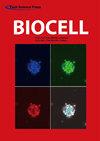Novel defined N7-methylguanosine modification-related lncRNAs for predicting the prognosis of laryngeal squamous cell carcinoma
IF 1
4区 生物学
Q4 BIOLOGY
引用次数: 0
Abstract
Objective: Through integrated bioinformatics analysis, the goal of this work was to find new, characterised N7-methylguanosine modification-related long non-coding RNAs (m7G-lncRNAs) that might be used to predict the prognosis of laryngeal squamous cell carcinoma (LSCC). Methods: The clinical data and LSCC gene expression data for the current investigation were initially retrieved from the TCGA database & sanitised. Then, using co-expression analysis of m7G-associated mRNAs & lncRNAs & differential expression analysis (DEA) among LSCC & normal sample categories, we discovered lncRNAs that were connected to m7G. The prognosis prediction model was built for the training category using univariate & multivariate COX regression & LASSO regression analyses, & the model’s efficacy was checked against the test category data. In addition, we conducted DEA of prognostic m7G-lncRNAs among LSCC & normal sample categories & compiled a list of co-expression networks & the structure of prognosis m7G-lncRNAs. To compare the prognoses for individuals with LSCC in the high- & low-risk categories in the prognosis prediction model, survival and risk assessments were also carried out. Finally, we created a nomogram to accurately forecast the outcomes of LSCC patients & created receiver operating characteristic (ROC) curves to assess the prognosis prediction model’s predictive capability. Results: Using co-expression network analysis & differential expression analysis, we discovered 774 m7G-lncRNAs and 551 DEm7G-lncRNAs, respectively. We then constructed a prognosis prediction model for six m7G-lncRNAs (FLG−AS1, RHOA−IT1, AC020913.3, AC027307.2, AC010973.2 and AC010789.1), identified 32 DEPm7G-lncRNAs, analyzed the correlation between 32 DEPm7G-lncRNAs and 13 DEPm7G-mRNAs, and performed survival analyses and risk analyses of the prognosis prediction model to assess the prognostic performance of LSCC patients. By displaying ROC curves and a nomogram, we finally checked the prognosis prediction model's accuracy. Conclusion: By creating novel predictive lncRNA signatures for clinical diagnosis & therapy, our findings will contribute to understanding the pathogenetic process of LSCC.新定义的n7 -甲基鸟苷修饰相关lncrna预测喉鳞癌预后
目的:通过综合生物信息学分析,寻找新的特异性n7 -甲基鸟苷修饰相关长链非编码rna (m7G-lncRNAs),用于预测喉鳞状细胞癌(LSCC)的预后。方法:本研究的临床资料和LSCC基因表达数据最初从TCGA数据库中检索并消毒。然后,通过m7G相关mrna和lncrna的共表达分析以及LSCC和正常样本类别之间的差异表达分析(DEA),我们发现了与m7G相关的lncrna。采用单变量和多变量COX回归及LASSO回归分析,建立训练类别的预后预测模型,并对照检验类别数据检验模型的有效性。此外,我们对LSCC和正常样本类别中的预后m7g - lncrna进行了DEA分析,并编制了预后m7g - lncrna共表达网络和结构列表。为了比较预后预测模型中高风险和低风险类别LSCC个体的预后,还进行了生存和风险评估。最后,我们创建了一个nomogram来准确预测LSCC患者的预后,并创建了受试者工作特征(receiver operating characteristic, ROC)曲线来评估预后预测模型的预测能力。结果:通过共表达网络分析和差异表达分析,我们分别发现了774个m7g - lncrna和551个dem7g - lncrna。我们构建了6个m7g - lncrna (FLG−AS1、RHOA−IT1、AC020913.3、AC027307.2、AC010973.2和AC010789.1)的预后预测模型,鉴定出32个depm7g - lncrna,分析32个depm7g - lncrna与13个depm7g - mrna的相关性,并对预后预测模型进行生存分析和风险分析,评估LSCC患者的预后表现。通过显示ROC曲线和nomogram来检验预后预测模型的准确性。结论:通过建立新的预测lncRNA特征用于临床诊断和治疗,我们的研究结果将有助于了解LSCC的发病过程。
本文章由计算机程序翻译,如有差异,请以英文原文为准。
求助全文
约1分钟内获得全文
求助全文
来源期刊

Biocell
生物-生物学
CiteScore
1.50
自引率
16.70%
发文量
259
审稿时长
>12 weeks
期刊介绍:
BIOCELL welcomes Research articles and Review papers on structure, function and macromolecular organization of cells and cell components, focusing on cellular dynamics, motility and differentiation, particularly if related to cellular biochemistry, molecular biology, immunology, neurobiology, and on the suborganismal and organismal aspects of Vertebrate Reproduction and Development, Invertebrate Biology and Plant Biology.
 求助内容:
求助内容: 应助结果提醒方式:
应助结果提醒方式:


